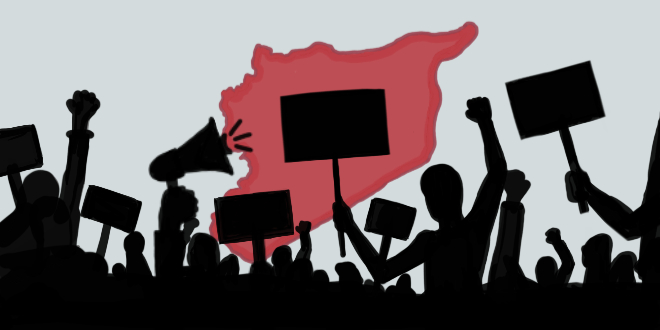Syria and the Left: The Pitfalls of Anti-Imperialism

Illustration by Breana Lee
Syria’s revolution was ignited in March 2011, following the arrest and torture of 15 teenagers who wrote graffiti on their school’s walls. Their graffiti invoked the revolutionary spirit of the Arab Spring, provoking reprisal from the violent, authoritarian, dynastic regime of Bashar al-Assad. One of the boys, 13-year-old Hamza al-Khateeb, was killed in custody.
Protests subsequently erupted all over Syria, marking the rejection of a repressive and inhumane government by its people. These protests were largely fueled by dissatisfaction with the government response to extreme poverty and unemployment brought on by a prolonged and devastating drought.
The Syrian government responded to these peaceful demonstrations with immense ferocity, murdering, torturing, and imprisoning hundreds of protesters for daring to challenge Assad’s authority. Since the summer of 2011, Assad’s regime has continued its violent campaign to repress any and all perceived opposition, employing bombs and chemical weapons against its own people. Subsequently, the legitimate suffering of Syrians under Assad’s regime has been co-opted by various entities in the international proxy war that emerged from what was originally a civilian uprising. Some of these entities include oppositional forces within Syria itself.
Anti-Assad rebel forces are fragmented into various groups, including the Syrian Free Army, ISIL/ISIS, Jabhat Fateh al-Sham, Hezbollah, and the Kurdish-led Syrian Democratic Forces. Some of these rebel groups have also enacted violence against civilians, subjecting the Syrian public to multiple fronts of oppression that principally targets the poor.
The conflict is further complicated by foreign intervention. The United States, U.K., Russia, and France, along with regional players such as Israel, Turkey, Iran, Iraq, Saudi Arabia, and Qatar, all play a role in militarizing the Syrian conflict. Though each of these powers has different — and often contradictory — interests in Syria, they ultimately function to intensify and protract the violence of an organic, internally-produced Syrian revolution through such means as conducting airstrikes and funneling arms.
The multidimensional and prolonged violence of the Syrian Revolution and War has resulted in the displacement of millions of Syrians, both internally and externally. Hundreds of thousands more have been killed, but livelihoods have been decimated in addition to lives; approximately 70% of Syrians live in extreme poverty, 58% are unemployed, and half of children no longer attend school. Reconstruction will prove extremely difficult given the mass destruction of infrastructure and economy.
Despite the manifest violence of the Assad regime, many leftist individuals in the United States and Europe have referred to the Syrian government as a ”liberating” force. This has come as a rude shock to Syrian refugees in their interactions abroad, and in some cases has alienated them from leftist circles.
In their aptly named podcast, “Irrelevant Arabs,” Syrians Loubna Mrie and Mustafa discuss their own experiences with leftists in the U.S., providing examples of the exhausting questioning they face at panels on Syria. Mrie states, “they just want to ask you again and again about regime change, about how we can prove that the atrocities of the Syrian government happened.”
In her opinion piece for Al Jazeera, Mrie provides an incisive response to such leftist claims — that the Syrian Revolution was orchestrated by the United States to serve their politico-economic interests, or that reports of Assad’s violent tactics have been fabricated to fuel imperialist propaganda. She recalls, “Protesters were shot dead with live ammunition. I lost many of my friends, I was shot at . . . So no, this is not a regime change imposed by the West. This is an uprising against an illegitimate dictator.”
Similarly, Syrian author, Leila Al-Shami, argues that “It’s morally objectionable, to say the least, to expect Syrians to just shut up and die to protect the higher principle of ‘anti-imperialism.’”
So why do “leftist” individuals and groups, who apparently devote themselves to social justice, proclaim support for a violent regime?
The source of this contradiction lies in the shallowness of their anti-imperialisms. Their analyses rest on the assumption that, since the U.S. backs anti-Assad rebel forces, Assad is a bastion of anti-imperialism; if his regime threatens U.S. interests, his regime ought not to be changed. Ironically, despite the Western left’s uncritical support of U.S. opponents, most do not support rebel factions denounced by the U.S., such as ISIS and Al-Nusra. Simplified good guy/bad guy logic breaks down in a landscape of conflicting interests and intricate power relations, in which reactionaries are battling out popular forces.
While this evaluation correctly touches on the ulterior (read: imperialist) motives of US involvement in Syria, its over-simplicity has insidious ramifications. In accordance with its record in other parts of the Arab world, the U.S. is primarily involved in Syria to replace Assad’s regime with one that more reliably aligns with U.S. interests, allowing it to exercise heightened control over oil-rich regional players. However, a unilateral analysis egregiously disregards interacting imperialisms — such as that of Russia, which benefits from the continuance of Assad’s regime. As a power that aims not only to secure material advantages, but to establish imperial standing in the Middle East, Russia has played a hand in erecting a series of Arab dictators that align with its interests, such as Muammar el-Qaddafi, Saddam Hussein, and Hafez al-Assad. Russia, therefore, is no more innocent than the U.S. in its Syrian entanglements.
Lebanese researcher, Joey Ayoub, adds to the critique of reductive anti-imperialist rhetoric in “progressive” Euro-American circles. He brands certain leftist iterations of anti-imperialism “essentialist,” which he defines “solely in relation to their own governments rather than on the basis of a universal opposition to all forms of imperialism.” The narrow scope of the ‘essentialist anti-imperialism’ employed by leftists has led many to unwittingly justify crimes against humanity — notably against the Syrian people.
Ayoub elaborates, “This anti-imperialism does not stop imperialism, quite the contrary: it pits imperialist powers against one another and sometimes even cheers on the one that just happens to not be its own.”
Additionally, a one-dimensional anti-imperialist analysis neglects the specific historical context of Syria itself. The violent histories endured by its people are brushed under the rug to serve an anti-imperialist abstraction, while the complex colonial and imperial landscape through which the Assad dynasty rose to power is also ignored. Present-day Syria experienced 400 years of Ottoman rule before falling prey to British and French interventions. Syria suffered decades under French mandate, followed by a series of coups that culminated in Hafez al-Assad’s rise to power.
Worst of all, this analysis invalidates the voices and experiences of the Syrian people. As Syrian writer, Yassin Al-Haj Saleh, explains, “We are denied ‘epistemological agency,’ that is, our competence in providing the most informed facts and nuanced analysis about our country. Either there is no value to what we say, or we are confined to lesser domains of knowledge, turned into mere sources for quotations that a Western journalist or scholar can add to the knowledge he produces.”
Al-Haj Saleh makes an important point about disadvantaged knowledge production in the Arab world. That is, “first-level knowledge producers” are located in America or Europe, despite their lack of nuanced, experiential understanding regarding Arab politics. Arab experts are relegated to the status of “native informant” despite intimate experience with local politics, “creating a one-way hierarchical structure whereby foreign sources are legitimized and local ones are not.”
Ironically, as Al-Haj Saleh points out, the denial of Syrian epistemological agency reproduces imperial logic in itself: “Practically, they are telling us that they are the ones who can define which struggles are in the right; and that we are not worthy of either revolutions or the production of knowledge. But isn’t that a wonderful definition of imperialism?”
In denying Syrians the agency to theorize their own situation, and in rejecting the very legitimacy of their revolution, Euro-American leftists enact imperial violence on a removed and infantilized Syrian populace. The violence of this paternalism is saturated with racist overtones, muddling the integrity of “progressive” movements with hypocritical inconsistencies.
In the U.S., the far left and far right commit parallel injustices by essentializing the motivations of varied Syrian actors; while the right reduces these motivations to religious or “civilizational” differences, the left reduces them to products of U.S. military intervention. Both conceptions deny Syrians political agency, and grossly oversimplify an intricate ordeal.
While anti-imperialist analytics are invaluable in this world of empires and increasingly internationalized conflicts, we need to concern ourselves with nuance where nuance is due.
What we need are more humbled, self-reflective anti-imperialisms. What we cannot forget is that, as members of imperial nations, we are so intricately complicit in projects of “Othering.” We must persistently question our perspectives and motives, and we must privilege the voices and experiences of the oppressed for whom we advocate by elevating their narratives instead of inserting our own.
“In Arabic, there is an etymological link between suffering and meaning. Mu’ana and ma’nan,” observes Al-Haj Saleh. “In the West, I’m sorry to say, they are very good at producing ma’nan, but they have no mu’ana. And people of the left, who specialize in interpreting human mu’ana, human suffering, should not teach us, the communities of mu’ana, the communities of suffering, what to do.”




